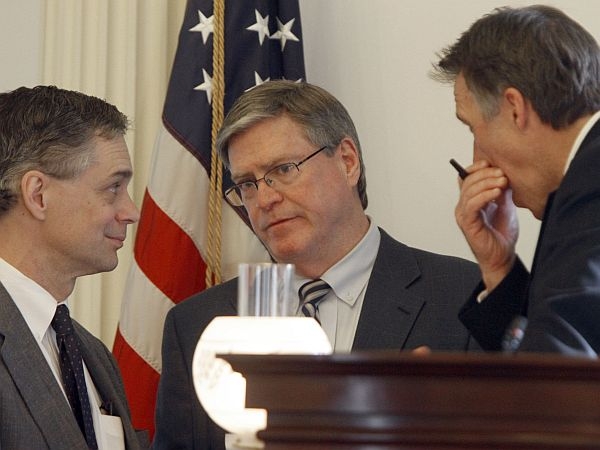
As the legislative session winds down, the Senate has a backlog of more than 30 bills to consider. Senate leaders say the backlog has been caused by extraordinary long debates on the Senate floor that often veer off the subject at hand.
The debate late last week over a recycling bill demonstrates the acrimony that has developed in the Senate.
Why is this happening? Senate President Pro Tem John Campbell says the answer is quite simple. He says a number of freshman senators want to express themselves on almost every bill – a situation that has led to very long debates:
"If there’s an issue, you don’t sit there and try to play Perry Mason or on the floor or you don’t try to play gotcha with your colleagues or additionally you don’t make everything sound bites where you’re going to either be heard on the radio or have your name put in the paper," Cambell said.
There are also some strong personal disagreements emerging in the Senate. Bennington senator Dick Sears was very upset when Chittenden freshman senator Philip Baruth posted comments about Sears on his blog. Sears responded to the criticism on the floor.
"Quite frankly Mr. President the level of discourse in this chamber and the level of collegiality has sunk to new lows in my opinion," Sears said. "Thank you."
Last Friday, the Senate considered a recycling bill for more than 6 hours and most of the debate was over a plan to expand the bottle deposit law. But the discussion also strayed off to focus on how campaign contributions might be influencing the debate.
Orange senator Mark MacDonald said the Senate defers too frequently to corporate interests.
"When we ask ourselves why do our constituents think we don’t support them and we support corporate interests is because when get to the fork in the road more and more often that’s what we do," MacDonald said.
But Senate President Campbell disagreed. "I am taken aback by that and the last time I checked we live in a capitalistic society and that making money is not a bad thing," he said.
This debate led Windham freshman senator Peter Galbraith to raise another question about the influence of corporations at the Statehouse. "I have been looking at corporate contributions and therefore I happen to have the list of corporate contributors," Galbraith said.
His comments drew criticism from the other senator from Windham County, Jeannette White. "Mr. President point of order. What is your point of order? I’m not sure how corporate contributions affects the question at hand which is whether we should expand the bottle bill or not," she asked.
Lt. Governor Phil Scott had this response. "I’m going to declare a short recess to confer with the Secretary."
Usually the proceedings in the Senate are quite polite but when Washington senator Ann Cummings grew frustrated with an explanation from Windsor senator Dick McCormack, McCormack offered this responded by saying "I apologize to the senator from Washington if my answers to the various questions that have been coming for about 6 hours now, over a 6 hour period if my answers have been inadequate I apologize."
Even more telling about the level of discord is the way parliamentary procedures have been used in the Senate this year.
When a senator feels that the debate has drifted too far from its original subject matter or if the senator believes a procedural action is not appropriate, they raise a "point of order" with the Lt. Governor, who is the presiding officer of the chamber.
Points of order were raised repeatedly in the debate over the recycling bill.
"Senator from Windsor. Mr. President I’m going to raise a point of order. I believe we are in the middle of a roll call. Are you bringing up a point of order? Yes. Your point of order is well taken. Point of order. Are we in the middle of a roll call? If we are is a motion in order ? Point of order. The pending question Mr. President is it not the first, third, and fifth proposals of amendment therefore I believe that the senator’s motion is not in order."
Finally, after almost 7 hours of debate, Lt. Governor Phil Scott announced the final vote on the bill and the end to another long and pointed Senate debate.
"The question now is shall the bill be read the third time. Are you ready for the question?", Scott asked. Then he continued, "If so, all those in favor signify by saying aye all those opposed signify by saying no – the ayes have it and you have mercifully ordered third reading of H 485."
Legislative leaders were hoping to adjourn this weekend but the Senate’s slow pace and its backlog of bills will delay adjournment for at least a week.